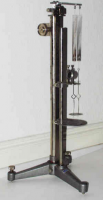








Jolly balance is an instrument for determining specific gravities. Invented by the German physicist Philipp von Jolly in 1864.
Principle
Jolly balance for determining the specific gravity (relative density) of solids and liquids.It consists in its usual form of a long, delicate, helical spring suspended by one end in front of a graduated scale. To the lower end of the spring is attached a weight pan and below that a small wire basket for samples. The difference in extension of the spring when the sample is suspended in air and in water represents the loss of weight in water; the weight in air divided by the loss of weight in water gives the specific gravity. The specific gravity of a liquid can be obtained by suspending any convenient specimen of a solid first in water and then in the liquid undergoing the test; the ratio of loss of weight of the solid in water and in the test liquid gives the specific gravity of the liquid.